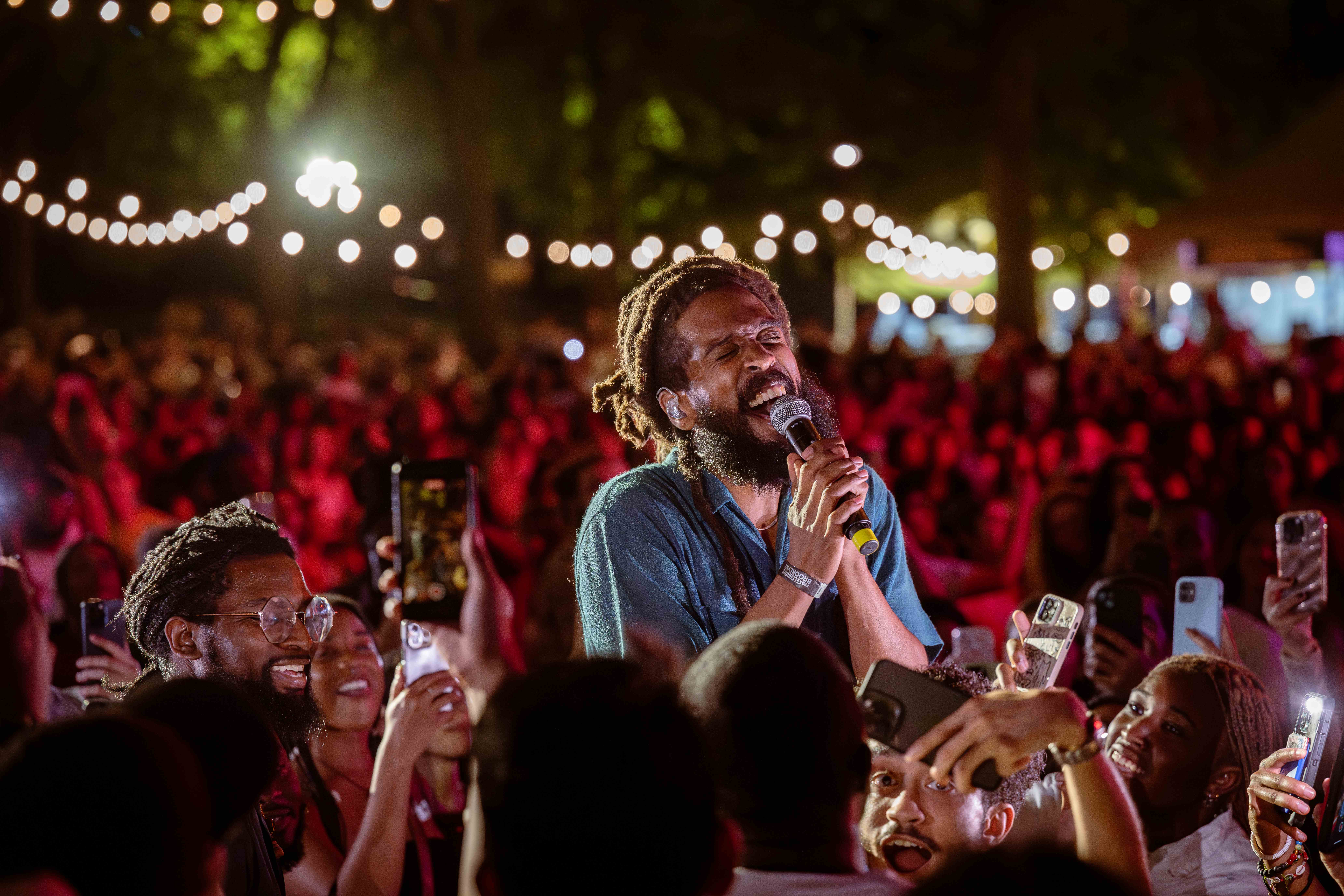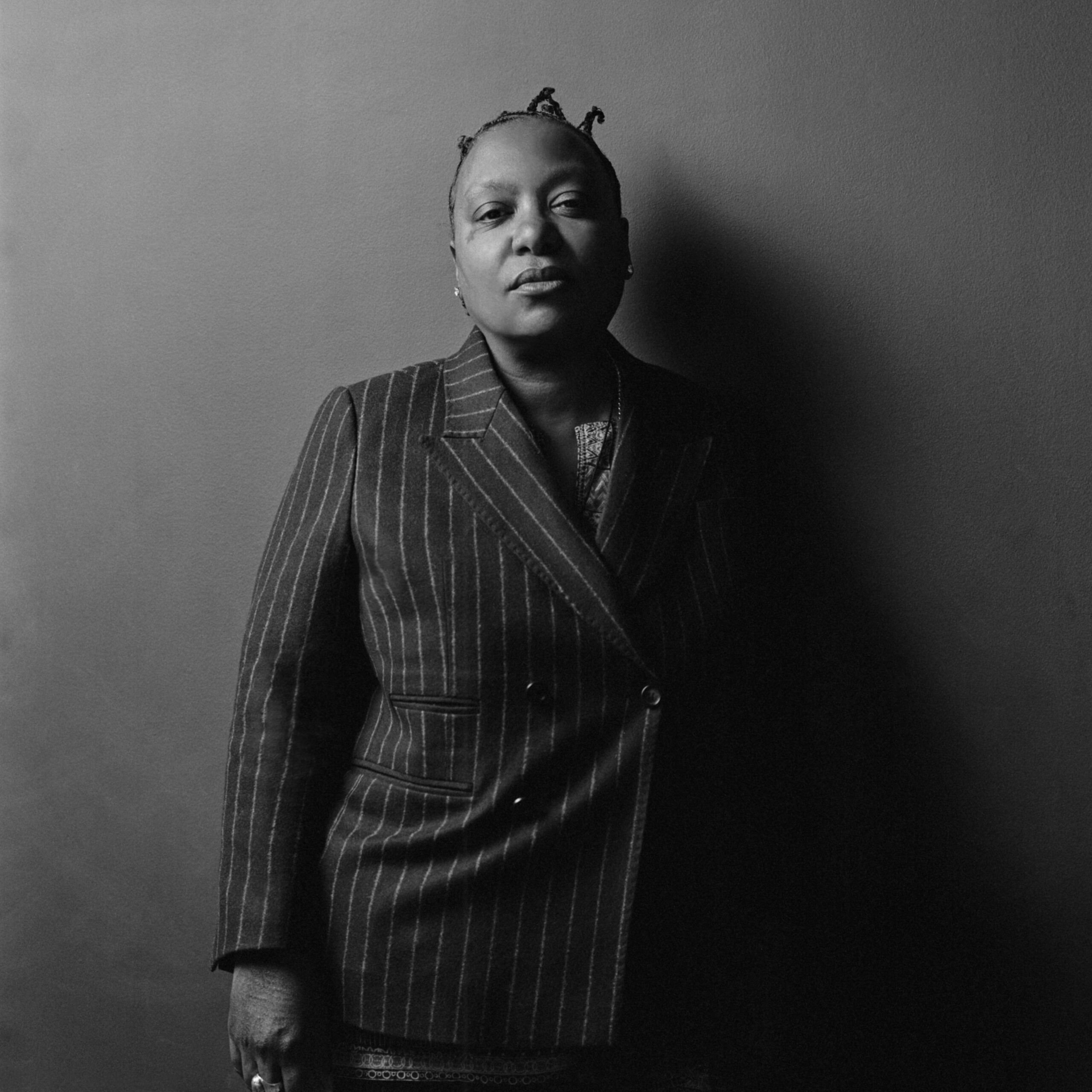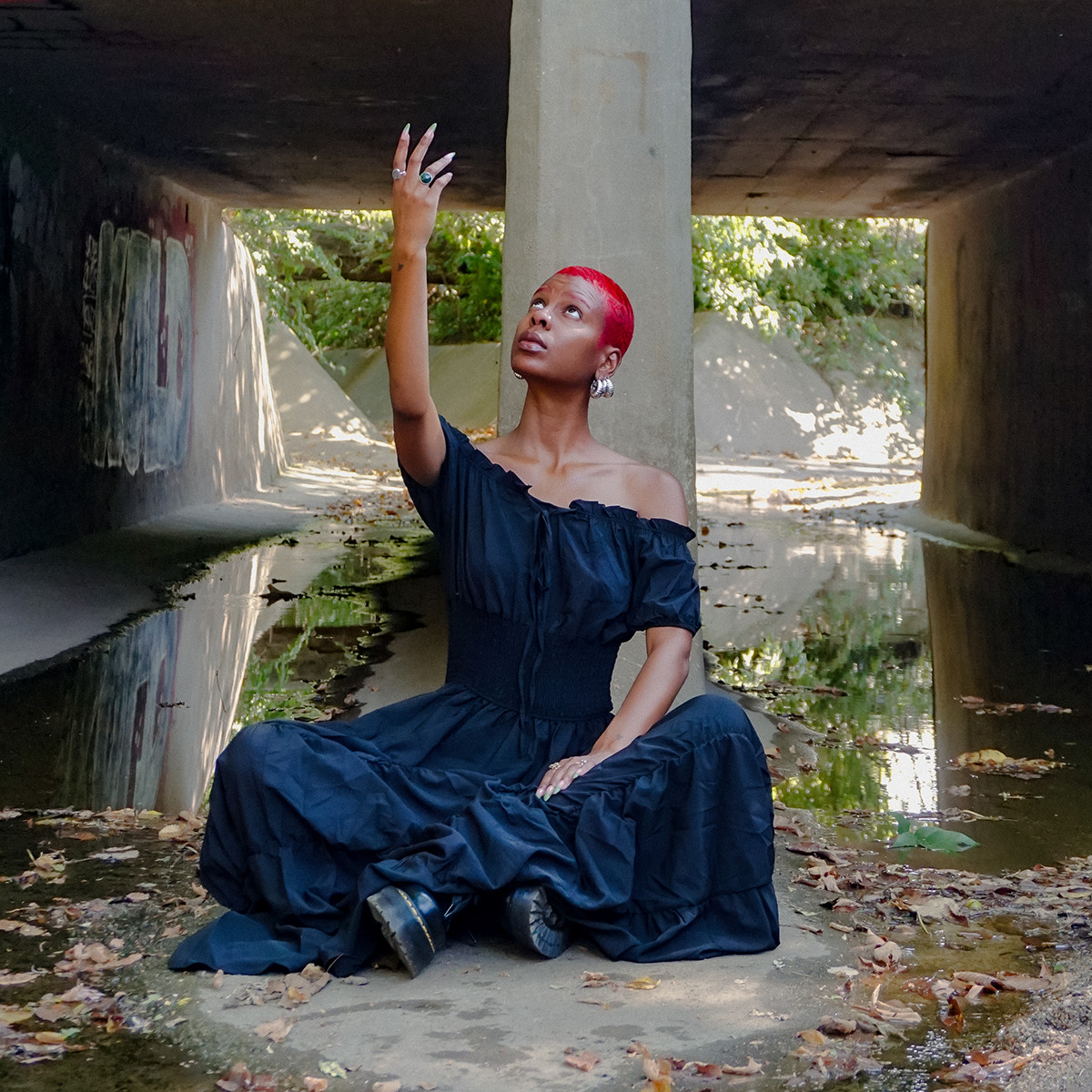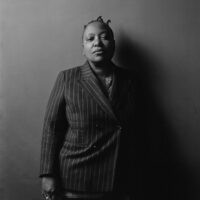The prescience of James Baldwin is alive nearly forty years after his passing, a testament to his enduring impact. A prolific writer, his essays, novels, plays, and poetry have assessed and often reproached the human condition. As an activist, his oratory prowess in the 1960s was bar none, lending his outspoken views on Black oppression with profundity and eloquence. Born in New York City on August 2, 1924, this year marks the centennial of the eminent writer, a momentous occasion that is celebrated by the release of one of Meshell Ndegeocello’s most intrepid efforts to date: No More Water: The Gospel Of James Baldwin.
With No More Water, Ndegeocello embarks on a prophetic musical odyssey that transcends boundaries and genres, delving headfirst into race, sexuality, religion, and other recurring themes explored in the celebrated writer’s canon. Following 2023’s The Omnichord Real Book, her acclaimed debut for Blue Note Records which won the inaugural GRAMMY Award for Best Alternative Jazz Album, the multi-instrumentalist, singer, songwriter, and producer renders an immersive and palpable document that is as sagacious, unabashed, and introspective as Baldwin was in life.
Co-produced by Ndegeocello and guitarist Chris Bruce,No More Water features some of the bassist’s frequent collaborators including Bruce, vocalist Justin Hicks, saxophonist (and Omnichord producer) Josh Johnson, keyboardist Jebin Bruni, and drummer Abe Rounds. Also appearing on various songs are a stellar group that includes vocalist Kenita-Miller Hicks, keyboardists Jake Sherman and Julius Rodriguez, and Executive Director of the NYCPS Arts Office and trumpeter Paul Thompson. The album also showcases spoken word byvenerated poet Staceyann Chin and Pulitzer Prize-winning author and critic Hilton Als.
Nearly a decade in the making, the album’s origins began in 2016 during a performance at The Harlem Stage Gatehouse as part of their annual showcase honoring Baldwin. Ndegeocello had delved into Baldwin’s work the year before, including the seminal nonfiction work The Fire Next Time, which she considers “life-changing” and carries with her as a “spiritual text.”
“It was just a revelation to me, and it softened my heart in so many ways,” says Ndegeocello. “I got a really quick education when I met Greg Tate, but nothing affected me like The Fire Next Time. It’s as if they’re speaking about my family, especially the first chapter: I grew up around Black men who didn’t want to be seen as soft, which is how he opens ‘A Letter to My Nephew.’”
Ndegeocello credits Baldwin’s essays with giving her a deeper understanding of the fraught history of race and class struggle in this country, specifically its lasting impact on her and her family. “As a Black American, you are devoid of any historical grounding other than what your parents give you. This allowed me to really see what my parents went through.”
“He talks about how the military ruined people. I think that’s the beginning of alcoholism with my father, the beginning of understanding that he would never rise above a certain rank. My mother was a domestic with a fourth-grade education. It just made me see them trying to raise a family, have a marriage, and be individuals in a society that’s been hard-wired for racism, bigotry, and classism.”
No More Water is a fitting title for the album. A double entendre, it is borrowed from The Fire Next Time,comprising two essays examining racism in America circa 1963: “My Dungeon Shook: Letter to my Nephew on the One Hundredth Anniversary of the Emancipation” and “Down at the Cross: Letter from a Region of My Mind.” It is also a nod to Baldwin’s religious beginnings as the son of a Pentecostal preacher. You can also find the couplet in some versions of the spiritual “Mary Don’t You Weep” and a biblical quote in the book of Genesis: “God gave Noah the rainbow sign/No more water, the fire next time.”
Thematically, the album moves like a procession in a Black church — baptism, testimony, worship/praise, and ultimately, resurrection. For the album’s opening track, “Travel,” we are brought inside the mind of a man on the verge of killing himself. Suicide is a recurring motif in much of Baldwin’s oeuvre — notably “Richard” in Go Tell It On The Mountain and “Rufus” in Another Country. It has also been a constant in his own life, from his near-suicidal attempts to the loss of his best friend in 1946. Setting a dystopian mood, Rodriguez’s organ and Chin’s echoing incantations help usher in Justin Hicks’ ominous vocals: “I’ll stay away with all the work to be done/I’ll be bleeding while you bake in the sun.”
“Raise The Roof”features Chin sans accompaniment as the intensity of her words captures the stark and harrowing reality of the pervasive racism we cannot seem to escape: “It must be in the fucking water being force-fed to the police, the prosecutor and the politicians who care nothing for Black bodies falling like leaves in late August…in Ferguson…in Cleveland…in Staten Island, only minutes away from where my own child sits, watching The Muppets take over Manhattan.”
Als, a leading authority on Baldwin’s life and work, lends his words to “On The Mountain,”inspired by Baldwin’s debut novel in which he recreates his childhood and tortured upbringing in the church through the lens of his precocious teen protagonist, “John Grimes.” Underscored with layers of West African-tinged, hypnotic percussion, Als engenders a spiritual realm for “John” (and for Baldwin) that embraces him wholly, sans bigotry and hatred: “Not a revolution of blood, but of the mind and hands that which builds not destroys.”
“The Price of a Ticket” is an homage to the protest songs of the 1960s in the vein of Dylan and Odetta. The song’s minimalist arrangement allows Bruce’s acoustic guitar and Ndegeocello’s searing vocals to reverberate even louder: “Don’t let them shoot me down, and I die.” A modern-day anthem of dissent, it is a sobering reminder that such songs are still relevant, even necessary today.
“The price of this ticket of being in this skin is real. Creatively, I don’t think you need a lot of production. Chris and I had the musical idea and wanted it to be something you could sing at a protest because you don’t need the instruments to sing it. I’ve been at the barrel of a gun — Hands up! You’ll find very few people talk about it because it’s just fucking unpleasant. I can’t imagine how so many people deal with that on a daily basis.”
“Pride I & II” is a groove-laden musical suite heavily steeped in West Africa. It places the rhythm section front and center, notably the thumping percussion and Ndegeocello’s signature dub base. It signals a spiritual awakening for Baldwin, perhaps one he never fully experienced in his lifetime, and for Ndegeocello as a queer, Black woman. For Ndegeocello, “Pride” is a reclamation of Baldwin’s identity, as well as her own.
“Pride comes before the fall — that’s what I grew up learning. But I also realized that pride sometimes turns us against each other. It's like a grand distraction. I no longer identify with the identity politics of all the letters and gay identity. I’m not going to let them label me. For some, that makes them uncomfortable. What I love about being accepted and brought up in that community is that it allows me to check myself and my hypocrisy, and I think we're having that reckoning as a country.”
No More Water renders songs with candid introspection that envisages the consequences and what that reckoning could ultimately look like. With “Trouble,”Rounds has a steady militaristic hand on drums as Ndegeocello, Justin Hicks, and Kenita-Miller Hicks on vocals softly call out, forewarning us about the battle that lies ahead for those brave enough to take up the charge; “Thus Sayeth The Lorde,”“Tsunami Rising,” and “Raise the Roof” combine the words of Chin, Baldwin, and feminist poet and activist Audre Lorde, another underrated queer icon, and in effect, giving us three generations of rallying cries; “Love”and “Hatred,”as explained by Baldwin in The Fire Next Time, are essentially two sides to the same coin — while one removes “the mask,” daring to live in their truth, the other “clings” to it, because once it’s gone, they will have to deal with the pain that lies underneath.
“Baldwin Manifesto I & II” again places Chin at the helm. Taken from his landmark speech “The Artist’s Struggle for Integrity,” Chin is initially unaccompanied but later backed by Johnson on saxophone. Baldwin underscores the value of the artist and their role and responsibility to the world, especially at times of crisis; the soulful dirge “Down At The Cross”rounds out the album with haunting guitar accompaniment from Bruce and vocals by Ndegeocello and Justin Hicks, returning to the notion of suicide raised since the start of the album. For countless Black men, notably Baldwin, suicide seemed like the only choice versus living in persecution when you’re only “crime” was that you were born Black: “Once you leave, there’s no turning back/Will it be better?”
No More Water marks a significant moment of self-discovery for Ndegeocello. She adds that Baldwin entered her life at precisely the right time. “It came when I was ready to look in the mirror. I’ve had to play Plantation Lullabies at a few shows. Looking back, I had an interesting perspective, but the dialogue was limited. It was more like a cathartic experience for a young person of color, whereas now I’m going, ‘How can I get us all to love each other? How can I get us all to see this for what it is?’”







